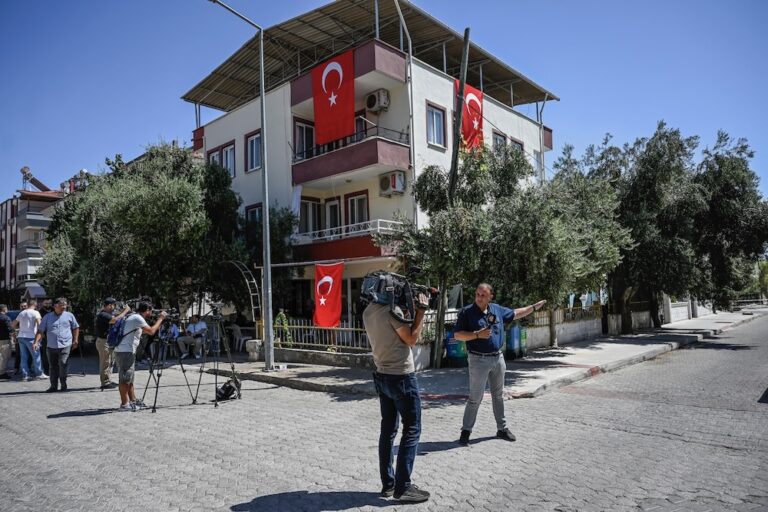(WiPC/IFEX) – Members of International PEN, the world association of writers, are protesting the decision to take to court one of Turkey’s most well-known writers, Orhan Pamuk, for comments seen to be “insulting” to the Turkish state. His trial is due to open in mid-December (see IFEX alerts of 2 September and 6 April 2005). […]
(WiPC/IFEX) – Members of International PEN, the world association of writers, are protesting the decision to take to court one of Turkey’s most well-known writers, Orhan Pamuk, for comments seen to be “insulting” to the Turkish state. His trial is due to open in mid-December (see IFEX alerts of 2 September and 6 April 2005). This move has been widely condemned internationally. At the same time other writers and journalists are on trial for commentary also seen to be insulting to the Turkish state, its officials and institutions. Most well known of these is the publisher Ragip Zarakolu, who has rarely been out of the courts because of his publications since the late 1970s.
In the next four weeks Zarakolu will be brought before courts three times in three separate cases. On 20 September an Istanbul court will preside over the latest in a series of hearings initiated in March this year against Zarakolu’s publication of George Jerjian’s book History Will Free All of Us/Turkish-Armenian Conciliation. The book is said to be “insulting” to the memory of Kemal Atatürk by suggesting that leading government figures close to Atatürk had been responsible for the mass deportation of Armenians in 1915. Zarakolu is being charged under articles of the Penal Code (art. 159/1 and art. 5186) that have since been removed following penal revisions put into place in June this year. The next day, another hearing will be held under the same law – this time for Zarakolu’s publication of a book by Professor Dora Sakayan’s An Armenian Doctor in Turkey: Garabed Hatcherian: My Smyrna Ordeal of 1922. On 11 October, Zarakolu will yet again appear in court to hear the latest in a series of hearings that started in May 2004 for an article published in 2003 entitled, “Sana Ne” (“Of No Interest”) that criticised Turkey’s policy towards the Kurds in Iraq. As for the hearing on 20 September, he is being tried under a law that has changed since the introduction of the new Penal Code.
Zarakolu has long been an advocate for minority and human rights in Turkey. In 1968 he began writing for “Ant” and “Yeni Ufuklar” magazines. In 1971 a military government assumed power in Turkey and convicted Zarakolu of working with an international communist organisation. He was imprisoned for three years. On his release Zarakolu steadfastly refused to abandon his campaign for freedom of thought, striving for an “attitude of respect for different thoughts and cultures to become widespread in Turkey”. Unable to publish certain works within Turkey, Zarakolu turned to the international market, whilst he circumvented the ban on criticism of Turkey’s military regime by turning his attention to abuses of human rights by governments in South America and elsewhere. The Belge Publishing House, established in Istanbul in 1977 by Zarakolu and his equally eminent wife Ayse Nur, has been a focus for Turkish censorship laws ever since. Charges brought against the couple – at one point there were over thirty government-brought actions – resulted in imprisonment for both Nur and Zarakolu, the wholesale confiscation and destruction of books and the imposition of heavy fines. In 1995 the Belge Publishing House offices were firebombed by an extremist rightist group, forcing it to be housed in a cellar. Since his wife’s death in 2002 Zarakolu has continued to face numerous prosecutions of which his current trials are all too familiar.
PEN recognises that today the situation is much improved from when the Belge Publishing House was first set up. But it is far from perfect. PEN has on its records 50 ongoing court cases against writers, journalists and publishers. Most cases end with acquittals or fines, and rarely imprisonment, but the legal process moves slowly, often taking months, sometimes years, before coming to a conclusion. The most recent revision to the Penal Code, put into place in June this year, shaved away a little more of the problematic elements that had in the past led to sentences that included life imprisonment. Yet there still remain laws that continue to penalise free speech. On 13 September, the EU’s Enlargement Commissioner, Olli Rhen, agreed that there are serious concerns about the Turkish Penal Code, adding that the trial of Pamuk is clearly in contravention of the European Convention on Human Rights, to which Turkey is a signatory.
International PEN, the world association of writers with centres in 99 countries, is deeply disappointed that, despite further changes to the Penal Code, there remains repression of freedom of expression in Turkey. PEN calls on the Turkish authorities to make further reviews of articles contained in the Penal Code that breach the international standards to which Turkey is committed. These standards include Article 19 of the United Nations International Covenant on Civil and Political Rights, as well as Article 10 of the European Convention on Human Rights. PEN recommends that pending such review, all trials against writers and publishers on charges that contravene international standards be halted.


